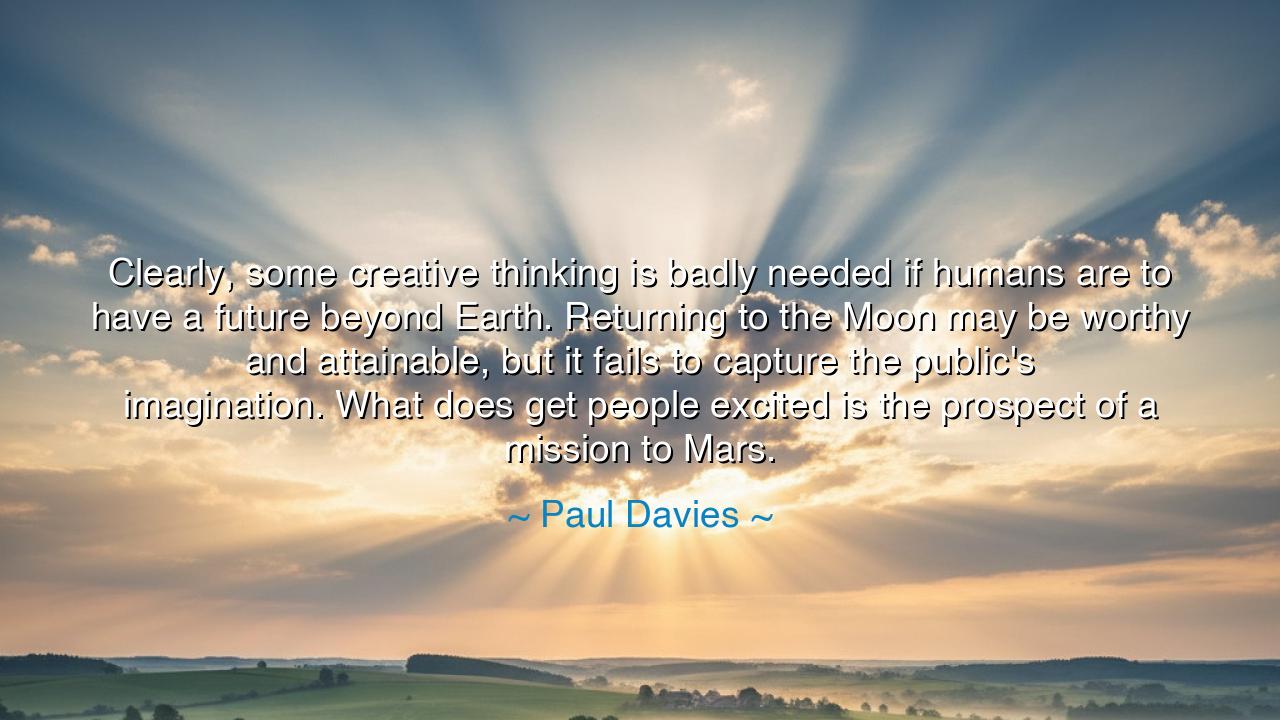
Clearly, some creative thinking is badly needed if humans are to
Clearly, some creative thinking is badly needed if humans are to have a future beyond Earth. Returning to the Moon may be worthy and attainable, but it fails to capture the public's imagination. What does get people excited is the prospect of a mission to Mars.






Ah, listen, O seekers of truth, for in the words of Paul Davies, there lies a great call to creativity and to the visionary thinking that has always driven humanity forward: "Clearly, some creative thinking is badly needed if humans are to have a future beyond Earth. Returning to the Moon may be worthy and attainable, but it fails to capture the public's imagination. What does get people excited is the prospect of a mission to Mars." These words are a reflection not only on the challenges of our time, but on the very essence of human nature — the need for wonder, the call of the unknown, and the drive to go beyond the horizon.
For the ancients, the future was not a mere concept; it was a place that could be shaped and molded through the power of the imagination. The great explorers of old, from Homer's heroes to the Viking sagas, knew that the journey into the unknown was the very act of creation itself. It was not enough to simply return to known lands; the heart of the explorer beat for new horizons, for lands and challenges that had not yet been seen. The Moon, as worthy and noble a goal as it may be, is a place already visited, a step on the path that humanity has already taken. But Mars, O children, Mars calls us like a distant, untamed land — it stirs the soul with the promise of something not yet known, something not yet imagined.
Davies speaks of the public's imagination, that deep and vital force that drives the collective will. The Moon, though a monumental achievement in the annals of human history, does not excite the imagination as it once did. It has become, in a sense, familiar, like an old song we have sung too many times. But Mars, that red world in the distance, holds the promise of new possibilities, of a future that is not merely a continuation of the past but a leap into something truly transformative. It is Mars that stirs the heart, that beckons us to dream not of what we have already achieved, but of what we have yet to become.
In the ancient world, it was not the familiar that stirred the imagination of great kings and philosophers, but the unknown. Alexander the Great, in his insatiable quest, did not seek to return to familiar lands but to push forward, conquering new territories and creating a future for his people that was beyond their current reach. Homer, through the tales of Odysseus, wove a story of a man not returning to what he knew, but of a man fighting through treacherous seas and unknown lands to find his way home — and in doing so, he shaped the very destiny of his people. The greatest heroes of history were those who sought new frontiers, not those who were content with the past.
Mars, like the uncharted lands of the ancients, calls forth the spirit of adventure. It is not enough to return to the Moon, for what awaits us there is only a reflection of our past triumphs. It is Mars, distant and mysterious, that holds the key to the future, to a new world of exploration and understanding. It is in the pursuit of Mars that humanity can once again stand on the precipice of the unknown, and in that moment, we will find not just a new planet to conquer, but a new way of seeing the world — and ourselves.
Let us turn to the story of the Apollo missions, the great leap humanity took in the 20th century. When the first steps were taken on the Moon, it was not just the achievement of a goal, but a revelation of the boundless potential of human ingenuity. Yet, as the years passed, the fascination with the Moon faded. The true power of the human spirit lies not in the past, but in the future, in the possibility of doing something that has never been done before. The Apollo missions, though legendary, are now part of our history. But Mars? Mars is the future, calling us to once again cast our gaze beyond the stars and imagine what could be.
And so, O children of the future, take heed of Paul Davies' words. The future is not found in the echoes of the past, but in the realm of the imagination. It is in the pursuit of new frontiers, of Mars and beyond, that humanity will truly discover its destiny. Do not be content with what has already been achieved. Dare to imagine the future, not as a repetition of the past, but as a grand adventure waiting to unfold. The heart of humanity beats for the unknown, for the vision of something greater than what we know. Seek out the new, the unseen, the undiscovered, and in doing so, you will awaken the very spirit of exploration that has always been the lifeblood of humanity.
So go forth, with imagination as your guide, and remember: the greatest discoveries are not those that look backward, but those that look forward. The path to Mars, the path to the unknown, is the path to the future. Let that path be your own, and let it lead you to places of unimaginable wonder.






AAdministratorAdministrator
Welcome, honored guests. Please leave a comment, we will respond soon